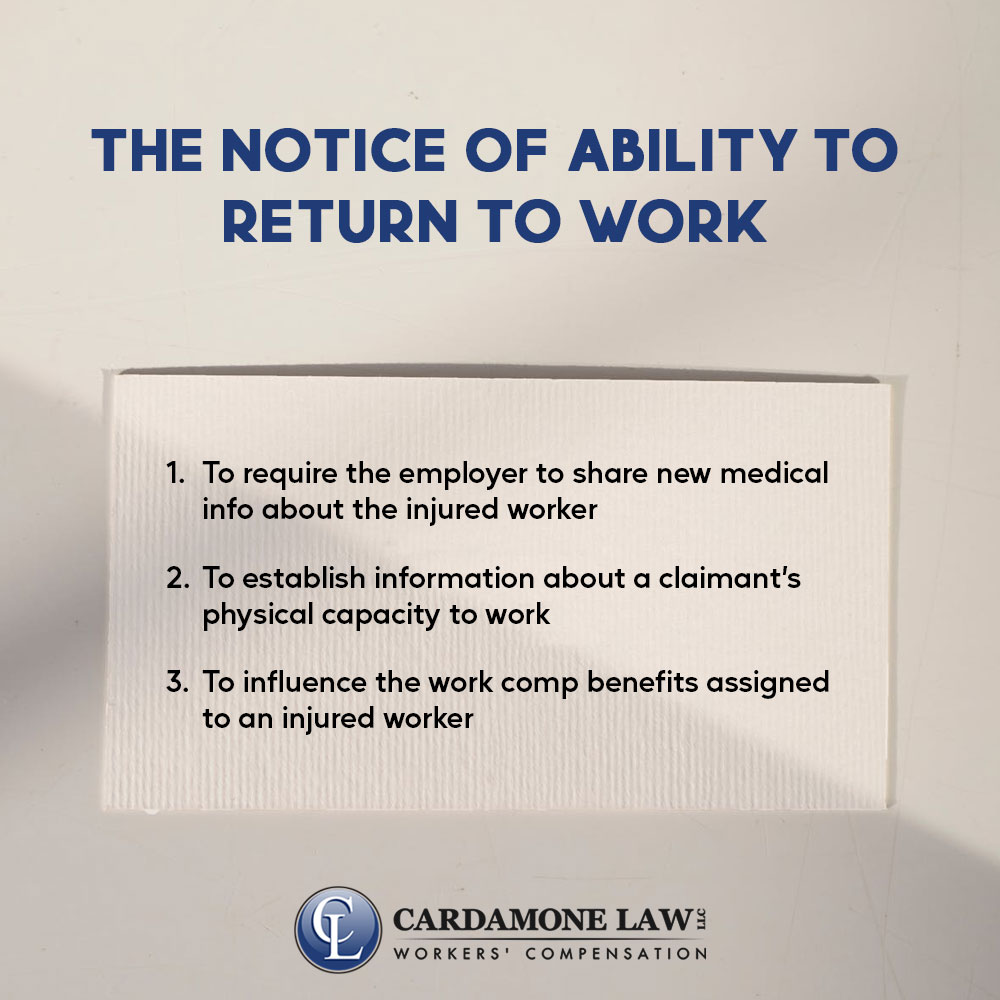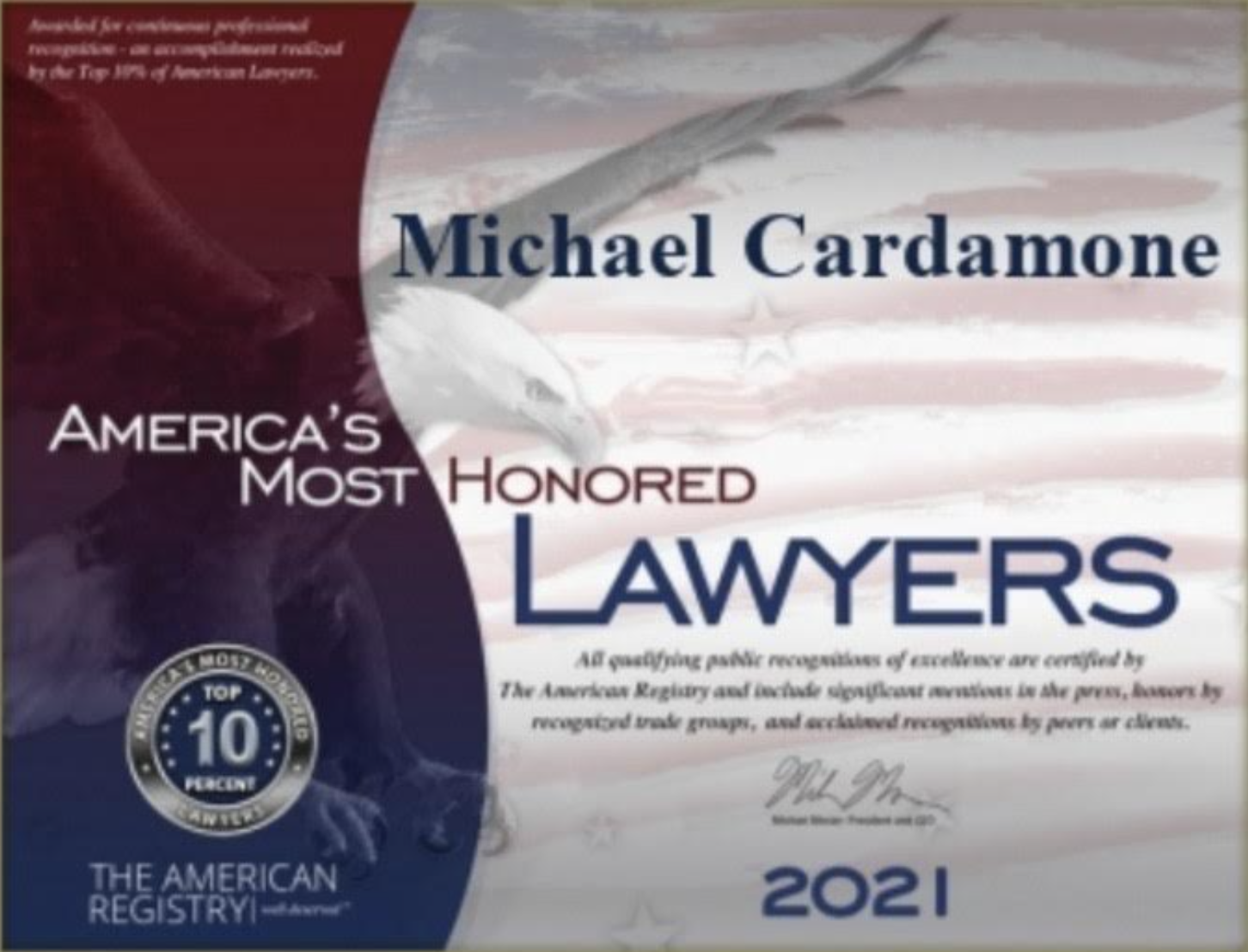Supersedeas is the employer or insurer’s request to reduce or eliminate indemnity (wage loss) benefits based on an allegation of a full recovery or an earning power. The request is made in the Petition to Terminate, Suspend, or Modify. The injured worker is allowed to rebut the request for Supersedeas. If you are an injured worker and do not have an experienced PA Work Injury Lawyer, you should contact me right away. Winning the Supersedeas is critical because if it is Granted- i.e., if the Judge grants Supersedeas, that means your checks will be reduced or eliminated based on the evidence presented at the first hearing. If Supersedeas is Denied, then the insurer has to keep paying at the rate there were paying before the petition was filed.
Supersedeas under the Pennsylvania Workers’ Compensation Law will not affect your medical benefits. Supersedeas only affects the wage loss portion of a Pennsylvania Work Comp case.
Litigation in a Pennsylvania Workers’ Compensation case can take up to a year or more. The Supersedeas Decision from a Work Comp Judge will happen soon after the initial hearing. Winning Supersedeas is really important and should not be taken lightly. The Supersedeas Decision from the PA Work Comp Judge is an Interlocutory Order– this means it is not subject to appeal like a final order on the merits of a case.
If a Petition to Terminate, Suspend, or Modify has been filed against you, call or email me for a quick and free consult. Your odds are defeating the workers’ compensation carrier are increased greatly if you have a certified work comp specialist working on your behalf.
For more info about Pennsylvania Work Comp Supersedeas or for a free consult, call Attorney Michael Cardamone at 215-206-9068 or email Michael@cardamonelaw.com
Representing Injured Workers Across Pennsylvania
The Cardamone Law Firm, LLC
Comp? Cardamone!
YES! It is a myth that an injured worker, who may have hurt her back in the past, cannot pursue workers’ compensation as a result of aggravating her back while working. I frequently talk with people who believe they cannot pursue PA Work Comp benefits because they had pain in the same body part before their work activities. It is simply not true. You can and should pursue benefits if your work activities aggravated your condition.
Under Section 301 (c) of the Pennsylvania Workers’ Compensation Act, the term “injury” and “personal injury” is defined as “an injury to an employee, regardless of his previous condition, arising in the course and scope of his employment and related thereto, and such disease or infection as naturally results from the injury or is aggravated, reactivated or accelerated by the injury….”
As you can see from the plain, clear language of the PA Work Comp Law, it doesn’t matter if an injured worker had a preexisting condition, so long as you can demonstrate that the condition was aggravated, reactivated, or accelerated by the work activity. However, you can rest assured that the insurance carrier’s attorney, and the doctors hired by the insurance carrier, will do everything they can to pin the current set of symptoms on the preexisting condition versus the work activities. Generally speaking, the longer the gap in treatment from the prior injury until the work-related injury, the better the case. On the other hand, if the injured worker was treating up until the work incident, it is a much tougher case to pin liability on the work activities, naturally. It is simply imperative for injured workers, in this context, to tell his or her attorney and treating physicians as much detail as possible as to 1) when they last treated, 2) what doctors they treated with before the work incident, 3) what type of treatment they had, 4) what symptoms, if any, are now different in location or extent versus pre-work injury, and 5) what specific work activities triggered the symptoms. Doing your homework before the first hearing is absolutely critical so that you know what you’re dealing with, before cross examination commences.
While the history is always important in a Pennsylvania Workers’ Compensation case, its importance is heightened in cases involving a claim of an aggravation of a preexisting condition. A careful review of the prior medical records will help determine the viability of the workers’ compensation claim. The family doctor’s records, especially, can be instructive as they often document the initial onset of symptoms and tell us which doctors were involved in the treatment. Similarly, make sure to read the current medical records to see if the doctor has addressed the issue- ie, did the work activities aggravate, accelerate, or reactivate a prior condition within a reasonable degree of medical certainty?
If you aggravated a preexisting medical condition as a result of your work activities, whether suddenly, or from repetitive work activities over a course of time, call Certified Pennsylvania Work Injury Attorney and Specialist, Michael W. Cardamone at 215-206-9068 for a free consult or email Michael@cardamonelaw.com 7 Days A Week.
The Cardamone Law Firm
The Firm For Injured Workers In Pennsylvania
No. Pursuant to the Commonwealth Court of Pennsylvania Decision in Southeastern Pennsylvania Transportation Authority (SEPTA), v. Workers’ Compensation Appeal Board (Cunningham), No. 2045 C.D. 2011. Claimant suffered a work-related injury to his right knee as a mechanic in June 1996- the Employer, after temporarily accepting his claim, then denied it. Claimant filed a Claim Petition. He returned to his pre-injury job shortly after the work accident. But in July 1996, Claimant was involved in a non-work-related car accident, injuring his left knee, low back, and left hand. He went out of work as a result. He had surgery for the work-related knee injury (right) in 1997 and returned to his pre-injury light duty position in April 1997. In December 1998, in a second non-work-related accident, Claimant was struck by a vehicle and hurt his left knee, low back, left hand, and left shoulder. He then stopped working and received sickness and accident benefits. He unsuccessfully tried returning to work in late December 1998 and has been out of work since.
The Workers’ Compensation Judge granted the Claim Petition and awarded total disability benefits for the periods in which Claimant was disabled from the June 1996 work injury and ongoing (to the extent he wasn’t already compensated). In August 2006, Employer filed a Petition to Modify and/or Suspend alleging that as of April 12, 2006, Claimant failed to respond in good faith to job offers referred to him within his physical and vocational abilities. During the litigation, Employer filed a second Petition to Modify/Suspend alleging Claimant was able to return to work as of November 9, 2005, but for his December 1998 non-work-related injuries. Employed deposed Dr. Joseph Bernstein, a board-certified orthopedic surgeon who opined that Claimant’s right knee had recovered sufficiently that Claimant was capable of performing sedentary work as of November 9, 2005 and that the only cause of Claimant’s continuing disability was the non-work-related December 1998 accident. Employer also presented the testimony of Michael Smychynsky, a vocational consultant, forensic economist, and certified rehabilitation counselor who interviewed Claimant and found jobs that he alleged were available to Claimant with wages of up to $400 per week. Claimant presented the testimony of Dr. Ronald Greene who concluded that Claimant was not capable of returning to work due to the condition of his right knee. The WCJ found that Dr. Bernstein’s testimony was more credible, granting Employer’s Modification Petition and reducing Claimant’s benefits for April 12, 2006 to January 26, 2007, and suspending his benefits as of January 26, 2007 as Claimant’s non-work-related injuries rendered him incapable of all possible work activity.
Claimant appealed and the Workers’ Compensation Appeal Board affirmed the WCJ’s Decision to modify Claimant’s benefits, concluding that Claimant waived the argument. But the Board agreed with the Claimant that the WCJ erred in suspending Claimant’s benefits because Employer failed to establish the availability of a job equal to or greater than Claimant’s pre-injury average weekly wage of $825.91 and thus reversed that portion of the WCJ’s Decision. On appeal, the Employer argued that the is not required to demonstrate job availability given that Claimant’s non-work-related injuries are totally disabling.
Unfortunately, the Commonwealth Court agreed with Employer’s argument. They first cited Section 413 of the Pennsylvania Workers’ Compensation Act and the Kachinski case in which our Supreme Court interpreted that section to mean that the employer who seeks to modify a claimant’s benefits must first produce evidence of a change in condition, then the employer must produce evidence of a referral to a then open job (or jobs) which fits in the occupational category for which the claimant has been given medical clearance, then the burden shifts to claimant to demonstrate that he has in good faith followed through on the job referral(s) and if the referral fails to result in a job then claimant’s benefits should continue.
The Commonwealth Court looked to the Pennsylvania Supreme Court case, Schneider, Inc. v. Workers’ Compensation Appeal Board (Bey), 560 Pa. 608, 747 A.2d 845 (2000), where the Court held that the employer was not required to show job availability where the claimant was totally disabled by non-work-related conditions. While the injuries in Schneider were more severe, the Employer was successful in showing that the facts were similar and that Schneider applies.
This holding contradicts the spirit of Kachinski. It is not a favorable ruling for injured workers in Pennsylvania. Employers should have to show job availability but Schneider and the instant case are making it easier for employers to modify or suspend claimants’ benefits by lowering the burden of proof required to suspend an injured worker’s benefits in similar circumstances.
Contact Pennsylvania Work Comp Attorney Michael W. Cardamone for a Free Consult 7 Days A Week. 215-206-9068; MyPhillyWorkersComp@Gmail.com; 100% for Injured Workers
The Cardamone Law Firm
The Firm For Injured Workers In Pennsylvania
First, you should call an experienced Pennsylvania workers’ compensation lawyer for a free consult. I am happy to provide that to you promptly, and at no charge.
There can be many reasons why the insurer in a Pennsylvania Workers’ Compensation case may not be paying for medical bills. First, what is the controlling document? Usually, it is a Notice of Compensation Payable which describes the accepted injury. This controls until it is amended by Stipulation or Court Order. Many injured workers in Pennsylvania get lulled into a false sense of security thinking that the insurer knows their injury is a low back disc herniation, for example- when in reality, the Notice of Compensation Payable almost always says “low back strain” or “low back contusion”. This can be a technicality on which the insurer hangs it hat in taking the position that it is not obligated to pay for medical bills for treatment relating to a disc herniation. How is this remedied? Your PA Work Comp Attorney can file a Petition to Review to challenge and expand the accepted work-related diagnoses. The Petition gets assigned to a Work Comp Judge and litigation follows.
Another reason a medical bill in a Pennsylvania Work Comp case may be unpaid is because the provider may not have billed the treatment on the proper billing form. They must also send the corresponding treatment note along with the form and it must be within 30 days of the treatment. If any of these elements are not met, the insurer has no obligation to pay. Note that if an insurer pays part of a work-related treatment, the provider may not “balance bill” the injured worker- in other words, it cannot send the balance of the unpaid portion to the injured worker for payment. Its remedy here is called Fee Review.
In addition to a possible Petition to Review, the attorney may consider filing a Penalty Petition if it feels the nonpayment of the medical bill was in violation of the Pennsylvania Workers’ Compensation Act. However, if this issue is one of “causation”-meaning the insurer is claiming the diagnoses on the bills don’t match the accepted injury, then a Review Petition is the proper mechanism to challenge this.
Unpaid medical bills cause major stress and financial damage in many Pennsylvania Work Comp cases. The litigation process is slow but the collection efforts are fast. If you have unpaid medical bills, contact your PA Work Comp Lawyer immediately so he or she can investigate the reason why and take the appropriate steps to ameliorate the situation. If you do not have a PA Work Comp Attorney helping you, it is strongly recommended as 1) You pay nothing out of pocket, 2) Your case will be better positioned for a lump sum settlement, 3) Pennsylvania Workers’ Compensation has become highly complex, and 4) Litigation can be expensive and the attorney will cover the costs.
If you have any questions, call Philadelphia Workers’ Comp Lawyer, Michael W. Cardamone.
Michael W. Cardamone- Certified Specialist in Pennsylvania Workers’ Compensation.
The Cardamone Law Firm, LLC
Comp? Cardamone!
215-206-9068
Michael@CardamoneLaw.com
Yes, but only in limited circumstances. This falls under the extraterritorial provisions of the Pennsylvania Workers’ Compensation Act, added in 1974.
Here are situations where an injured worker can pursue Pennsylvania Workers’ Compensation benefits if the injury takes place outside of Pennsylvania:
1) the employment is principally localized in Pennsylvania; OR
2) the employee is working under a contract of hire made in Pennsylvania in employment not principally localized in any state; OR
3) the employee is working under a contract of hire made in Pennsylvania in employment principally localized in another state whose workers’ compensation law is not applicable to his or her employer; OR
4) the employee is working under a contract of hire made in Pennsylvania for employment outside the United States and Canada.
[note that you have a choice- thus the “OR“, rather than “AND“]
Naturally, the next question is what does “principally localized in Pennsylvania” mean? Section 305.2(d)(4) defines it as follows: “A person’s employment is principally localized in this or another state when (i) his employer has a place of business in this or such other state and he regularly works at or from such place of business, OR (ii) having worked at or from such place of business, his duties have required him to go outside of the State not over one year, or (iii) if clauses (1) and (2) foregoing are not applicable, he is domiciled and spends a substantial part of his working time in the service of his employer in this or such other state.”
Additionally, there may be questions in a particular case as to what “regularly works” means as well. These are often complicated fact patterns and I am happy to work through your facts and apply them to the framework above to render my opinion as to whether Pennsylvania will have jurisdiction. Pennsylvania has more favorable workers’ compensation laws, generally speaking, for injured workers than many surrounding states. We are a lost earning power state so wage loss benefits can be payable, theoretically, without end, so long as the work-related injury causes a loss in earning power. (noting that once a conversion to partial disability applies, there is a 500 week cap).
If you were injured outside of Pennsylvania, but believe one of the above circumstances may apply to your case, call or email Certified Pennsylvania Work Comp Attorney Michael W. Cardamone at (215) 206-9068 or Michael@CardamoneLaw.com
The Cardamone Law Firm
Comp? Cardamone!
Absolutely not.
The IME report is simply an opinion from a hand picked doctor by the insurer. The IME doctor does not have the final say- the Work Comp Judge does! You will be able to have your doctor’s reports, or deposition, taken to defend any allegation of a recovery, in addition to your own testimony.
If the IME doctor claims you are fully recovered from your work injury, the insurer’s attorney will file a Petition to Terminate benefits. The mere filing of the petition, or the receipt of the IME report, does NOT stop your checks if you are currently receiving them. The checks can only stop via Court Order in this context (there are a few exceptions which we’ll discuss later). Once the petition is assigned to a Work Comp Judge, then a notice of hearing will be sent. The first hearing is called a Supersedeas hearing. The insurer’s attorney will submit a copy of the IME report and ask the Judge to cut off the wage loss benefits. The Judge will allow the Claimant (ie, injured worker) time to respond. It is imperative that you retain an experienced Pennsylvania Workers’ Comp Attorney right away to defend the request for Supersedeas. If you win the Supersedeas issue, your checks will continue as the litigation takes place. Winning at the Supersedeas level is critical because the litigation can take up to a year or longer so you will need that cash flow as the months pass by.
Short of a Court Order cutting off the wage loss checks, there are only a few situations where the insurer can stop sending you your work comp checks. One situation is if they send you LIBC forms asking you about whether your condition has changed, whether you are working, whether you are receiving unemployment, social security (old age), pension, or severance payments. If you fail to return these forms within 30 days, the insurer can cease payments until they receive them. Another example of the insurer being allowed to stop your checks (or reduce them), short of a Court Order, is if you return to work of course- you must report the earnings so that the insurer can calculate what if any payments are due based upon your pre-injury average weekly wage and the amount of current gross weekly earnings.
Do not panic if you receive a Notice of Ability to Return to Work and/or an Independent Medical Exam (it’s not “independent”- it’s a defense exam). If you are receiving work comp checks, the receipt of these documents will not stop your checks in and of themselves. For more info about how Pennsylvania Work Comp works, call or email me 7 days a week.
Michael W. Cardamone – Certified Pennsylvania Work Comp Lawyer For Injured Workers
The Cardamone Law Firm, LLC
(215) 206-9068
NO!
So many injured workers mistakenly believe that their nurse case manager is their friend and looking out for them. WRONG! They are essentially a spy hired by the employer or insurer to interfere with your medical appointments and to put pressure on the doctor to release you back to work. You are an adult and do not need a nurse case manager to interfere in your case. While many of them are nice, hard working people who are just doing their job, you have to always remember that they do NOT have the same interests as you. Your interest is to obtain all the benefits you deserve given your medical condition. Their interest lies in getting you off of work comp as soon as possible without regard to how it affects your life.
Insurers love nurse case managers because they act almost like an investigator. The nurse case managers can obtain information from the injured worker and perhaps take it out of context, thereby prejudicing the doctor and/or adjustor. Injured workers often feel intimidated and believe that the nurse case manager is a requirement. This is not true.
Having an experienced and Certified Pennsylvania Work Comp Lawyer on your side is a way to maximize your benefits. Having a nurse case manager involved is a way to minimize your benefits. It’s true.
If you want more information about the role of Nurse Case Managers and Pennsylvania Workers’ Compensation, call or email me 7 days a week. Cardamone Law is here to help.
Generally speaking, the answer is NO.
If your claim was denied by the Employer/Insurer, then you will be litigating what’s called a Claim Petition before a Pennsylvania Workers’ Compensation Judge. The judge, in this context, does not make any Decision at the first hearing. Most judges will hear the injured worker’s testimony at the first hearing, although some judges hold a “Pre-Trial” where they simply confer with the attorneys about the landscape of the case and evidentiary matters. After the first hearing, most judges will follow the Special Rules and allow each side 90 days to present their medical and factual evidence. That accounts for 6 months between both sides and doesn’t include possible extensions as a result of the unavailability or scheduling conflict of witnesses. After the record closes, the parties have to submit written arguments, called Briefs. The workers’ compensation judges will usually allow approximately 90 days or so for these to be submitted after the record closes. Then, it’s a waiting game for the Decision to arrive in the mail- that can take a few weeks to several months depending on the judge’s case load.
If you are already receiving Pennsylvania Workers’ Compensation benefits, your first hearing is likely to be a Supersedeas Hearing after the Employer/Insurer has filed a Petition to Terminate, Suspend, or Modify benefits. Even at these hearings, the judges do not make any Decisions. They will issue an Interlocutory Order within a few weeks of the Supersedeas Hearing, which is an Order that is not subject to appeal, and it will advise the parties as to whether the wage loss benefits will continue as the rest of the litigation unfolds. Supersedeas can be a tricky concept so feel free to call me for further explanation as it applies to your case.
It can be extremely frustrating for an injured worker to comprehend how long the litigation process takes. There are many reasons why it takes this long. First, in the United States, we are lucky to have Due Process- the right to be heard. Both sides- that is, the injured worker and the Employer, have the right to present evidence supporting their respective positions. Second, Pennsylvania Workers’ Compensation is a high volume area of the law with many cases and only so many judges to hear them. Third, it is not easy obtaining deposition dates from a doctor when trying to coordinate it with the busy schedules of two or more attorneys, a court reporter, etc. These are just some of the reasons why it can take a year or more to reach a conclusion in a PA Work Comp case. Remember, however, that the majority of cases will settle. The settlements can be effectuated by a Compromise & Release- a “global” settlement if you will, or by a Stipulation, or even by a Supplemental Agreement.
The key for injured workers is cash flow. If your claim was denied, and if the litigation can take up to a year to resolve, finding a way to survive financially is paramount. A few options to look into are: short and long term disability, unemployment compensation, and social security disability. I will be happy to discuss how to apply for these benefits and what impact, if any, the receipt of such benefits will have on your case.
I am available 7 days a week for a free consult. I am one of approximately 75 attorneys across the entire State of Pennsylvania, who represents injured workers and who is a Certified Specialist in Pennsylvania Workers’ Compensation. I don’t dabble in many types of cases like most attorneys- I only handle Pennsylvania Work Comp cases for injured workers.
Free Consults, The Cardamone Law Firm 215-206-9068 or email Michael@CardamoneLaw.com
I discussed what Notice of Ability To Return To Work means in a PA Work Comp case in a previous post in January 2013. I re-post it below as I am getting more and more questions from clients and prospective clients about a Notice of Ability To Return To Work.
The Notice of Ability To Return To Work According To Pennsylvania Workers’ Compensation Act
I get many phone calls from clients and prospective clients about the peculiar document, called a Notice of Ability To Return To Work. This is a form, LIBC 757, sent to an injured worker pursuant to Section 306(b) (3) of the Pennsylvania Workers’ Compensation Act.

Image Source: Pexels/Andrea Piacquadio
The Contents of Notice of Ability To Return To Work
That provision states, “If the insurer receives medical evidence that the claimant is able to return to work in any capacity, then the insurer must provide prompt written notice, on a form prescribed by the department, to the claimant, which states all of the following:
1) The nature of the employee’s physical condition or change of condition.
2) That the employee has an obligation to look for available employment.
3) That proof of available employment opportunities may jeopardize the employee’s right to receipt of ongoing benefits.
4) That the employee has the right to consult with an attorney in order to obtain evidence to challenge the insurer’s contentions. (emphasis added)
The Notice of Ability To Return To Work Form is often misinterpreted as an actual offer by the time of injury Employer for the Claimant to return to work. This is not true- unless the form is actually accompanied by a job offer letter. The Notice of Ability To Return To Work in a PA work comp case is simply what is says- it’s a notice. Be careful to make sure a job offer isn’t enclosed with the Notice.
The Purpose of the Notice
What is the purpose of the Notice sent to injured worker? The Commonwealth Court of Pennsylvania, in Burrell v. Workers’ Compensation Appeal Board (Philadelphia Gas Works), 849 A.2d 1282, held that “the purpose of the notice requirement is to require the employer to share new medical information about a claimant’s physical capacity to work and its possible impact on existing benefits”. The Court in Burrell also noted that formal notice is not required where a claimant is actually performing the work.

Image Source: Pexels/Anna Nekrashevich
What if there is a conflict between IME Doctor and Treating Physician?
Another source of confusion regarding the Notice of Ability To Return To Work is that the Notice often comes on the heels of an independent medical exam- that is, an exam by a doctor which the work comp insurer chooses. The IME doctors frequently claim that an injured worker is either fully recovered from her work injuries or that the injured worker has the ability to work within certain restrictions. This opinion often conflicts with the injured worker’s own doctor. The treating physician may believe the injured worker cannot work at all, or that she needs more restrictions than the IME doctor imposed.
Therefore, the injured employee may be confused about what restrictions the Employer will utilize is making a possible job offer- the IME doctor’s restrictions or her own doctor’s restrictions. It is strongly recommended that the injured workers call an experienced Pennsylvania Work Injury Lawyer to discuss this situation. The next move taken by the injured worker can make or break a case.
What If The Insurer Fails To Send The Notice Of Ability To Return To Work In A Work Comp Case?
The failure of an insurer to send the Pennsylvania Work Comp Notice of Ability To Return To Work will sometimes, by itself, defeat an attempt by the employer/insurer to reduce benefits. For an employer to successfully reduce benefits, it must send out this Notice promptly. There are some exceptions, however. For example, in Smith v. Worker’s Compensation Appeal Board (Caring Companions, Inc.), No. 417 C.D. 2012, the Commonwealth Court found that the Notice of Ability To Return To Work was not required because Claimant herself had provided her employer with a copy of her doctor’s restrictions. The purpose of Section 306 (b)(3) had already been achieved.
What To Do If You Receive A Notice Of Ability To Return To Work?
If you get a Notice of Ability To Return To Work, call Pennsylvania Workers’ Compensation Certified Attorney and we will discuss with you how it affects your case. Our lawyers are available 7 days a week at 215-206-9068 (direct dial) or via email at Michael@CardamoneLaw.com
Yes! Mediations are very effective in helping to resolve a case. The PA Work Comp Judges, at the first hearing, will usually schedule a mandatory mediation-unless the parties agree that it is futile. An example of futility is if the insurer doesn’t give the attorney any authority to settle the case for a lump sum. But in most cases, the parties will agree to mediate. Even if a mandatory mediation doesn’t occur, the parties can elect to do a voluntary mediation and pick any judge they want.
Why is mediation so effective? First, the parties are not on the record. The injured worker is free to say whatever he or she wants without having to worry about the presiding judge hearing it. It’s less formal. If one or both parties are being unreasonable, the judge can help persuade them. Even if a case doesn’t completely settle at a mediation, it can often streamline the issues. Sometimes, the mediation is an important step in a long settlement process.
Remember- even if the mediating judge believes an injured worker should settle at a certain amount- it is NOT a requirement to settle for a lump sum. The same goes for the insurer. It’s an agreement between two parties, not a unilateral agreement.
Can You Change Your Mind After Mediation? Yes. A Pennsylvania Work Comp Settlement is not finalized until a work comp judge approves it a Compromise & Release Hearing. Usually, if a case settles at mediation, the settlement hearing takes place 2 to 4 weeks later.
For more information about mediation in PA Work Comp cases, call or email 7 days a week. Michael@Cardamonelaw.com
Comp? Cardamone!















